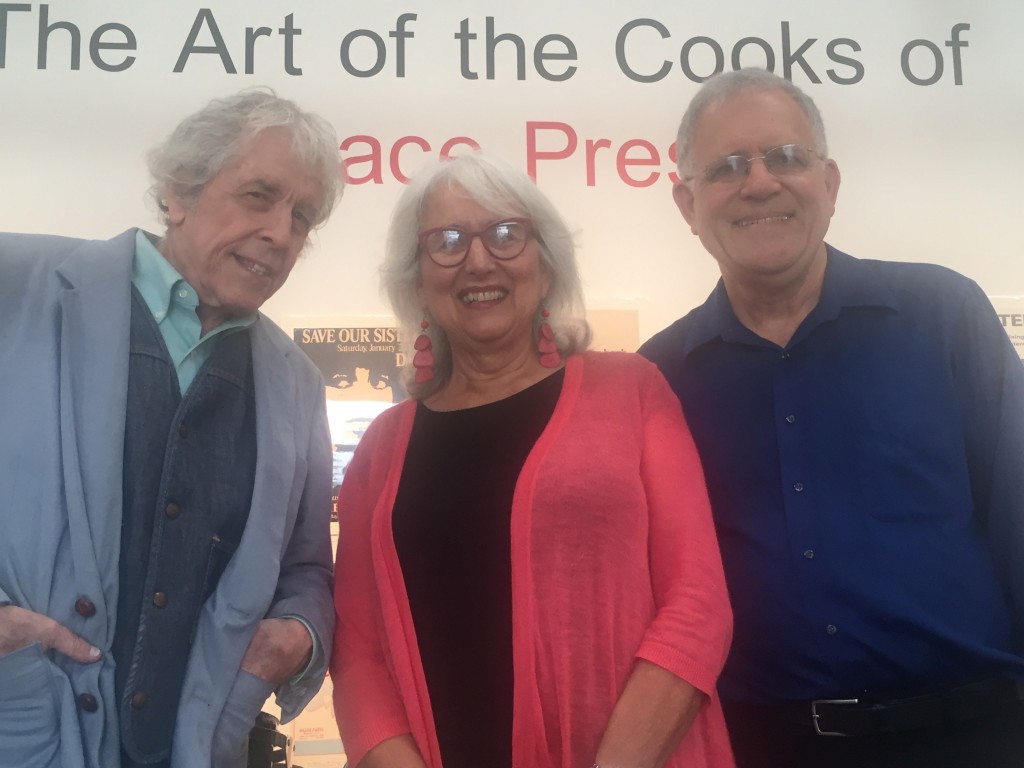Sunday morning, August 20, 2017
A week and a half ago, a half-dozen Los Angeles poets (Amelie Frank, Laurel Ann Bogen, Steve Goldman, Lynne Bronstein, Luis Campos, and Phoebe MacAdams Ozuna) launched a GoFundMe campaign on behalf of Holly Prado and Harry Northup, who recently lost their possessions in a nocturnal electrical fire in their apartment that nearly took their lives. Two hundred and twenty-five people have responded to the appeal, and slightly over $23,000 has been raised. The original goal was $20,000, and it speaks to the stature that Holly and Harry have within Southern California poetry that writers, readers, and artists have responded with such generosity to their need. If 75 more people contributed $25 each, the campaign would then have 300 total contributors to a $25,000 fund.
I do want to reiterate that once they are settled back in their residence, it would help them immensely to have a working library again. I would like to suggest that Beyond Baroque hold a book party to which the poets and readers of poetry of Los Angeles contribute as many books as possible. One possibility would be to have a “library committee” of poets go through the piles of books, pick out volumes they believe would most interest Holly and Harry, and then invite them to make their choices, after which we could haul their new library to East Hollywood.
Tuesday evening update:
The GoFundMe campaign to assist Holly Prado and Harry Northup has almost reached the $16,000 level of donations. The project is at the 80 percent mark. Over 170 people have contributed so far. If another forty or fifty people would make a small donation, we would all be able to savor the generosity of our community in helping two of our own recover from a devastating loss.
Once again, my thanks to all of you who have helped these old friends.
Tuesday morning, August 15, 2017
OVER HALFWAY TO THE GOAL OF HELPING HOLLY AND HARRY
Almost 150 people have responded to the GoFundMe campaign to raise funds to help Holly Prado and Harry Northup recover from the fire that devastated their apartment recently. After only four days, almost $13,000 has been pledged to their support. We are only $7,000 away from completing this project. I realize that many of the people who have given have already asked their friends and artistic colleagues to contribute, too, so this final third of the fundraising will not be as easy as the initial push. Nevertheless, I believe there are still many people who would be willing to contribute if they knew about Holly’s and Harry’s plight. Both of them are poets who have responded with absolute imaginative integrity to Cary Nelson’s question at the end of Repression and Recovery: “What is the social value of a life devoted to poetry?”
Harry and Holly met in the mid-1970s, shortly after I had published Feasts, Holly’s novella of “autobiographical fiction.” According to Harry, he felt inspired to meet Holly after reading Feasts. They have been inseparable since then.
Should any of you need quick and easy links to send to people who may not be familiar with Harry’s and Holly’s writing, please avail yourself of the following:
(for Holly Prado)
https://www.culturalweekly.com/holly-prado-three-poems/
http://www.oac.cdlib.org/findaid/ark:/13030/kt3199q9f8/
http://www.worldcat.org/title/feasts/oclc/610178149&referer=brief_results
(for Harry Northup)
http://articles.latimes.com/1993-05-21/news/va-37959_1_harry-northup
http://timestimes3.blogspot.com/2014/03/for-my-love-sleeping-by-harry-e-northup.html?view=sidebar
http://www.worldcat.org/title/enough-the-great-running-chapel/oclc/8506024&referer=brief_results

 About Bill Mohr
About Bill Mohr